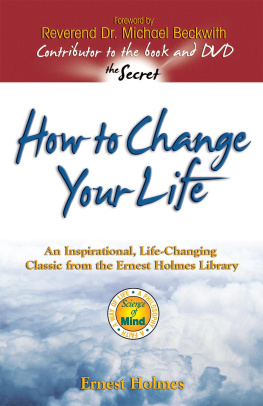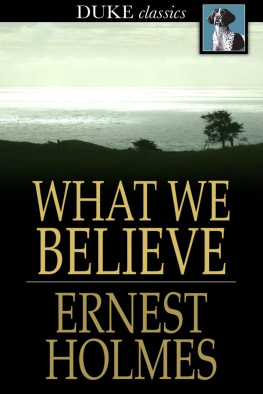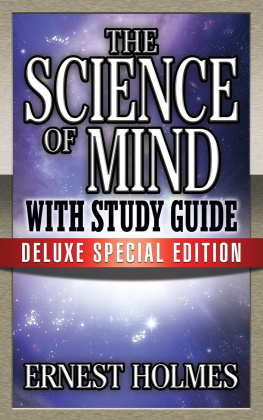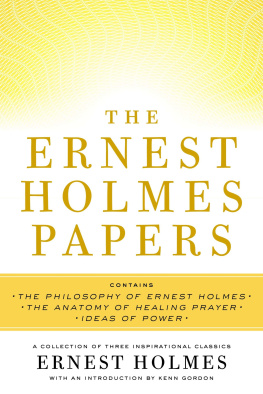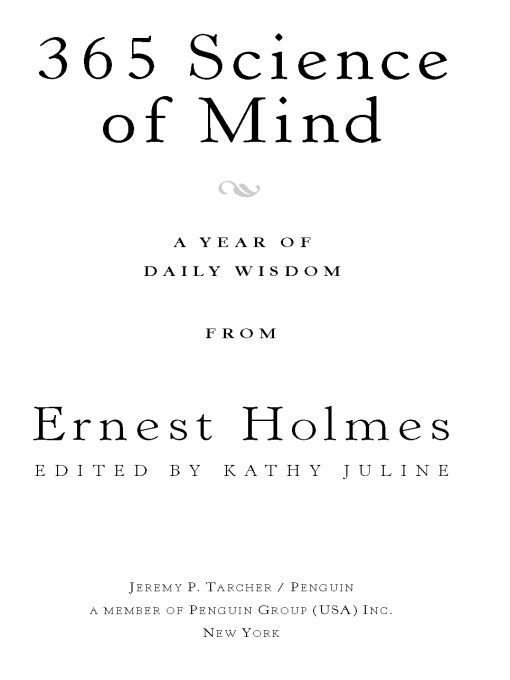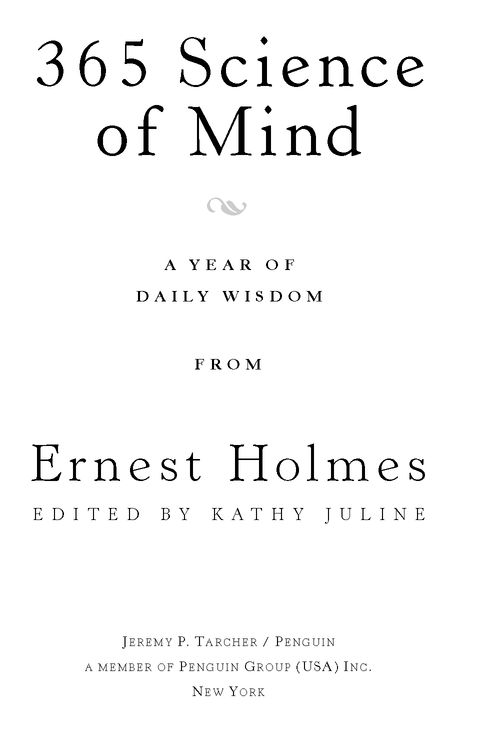Table of Contents
TITLES BY ERNEST HOLMES
PUBLISHED BY TARCHER / PENGUIN
365 Science of Mind
The Art of Life
Creative Mind
Creative Mind and Success
The Essential Ernest Holmes
The Hidden Power of the Bible
Love and Law: The Unpublished Teachings
Prayer
The Science of Mind: The Definitive Edition
This Thing Called You
INTRODUCTION
In 1927 a little magazine called Religious Science, later renamed Science of Mind, began what has now been more than seven decades of continuous publication. The early issues, collectors items today, contain language that to our contemporary ears occasionally sounds flowery or old-fashioned. Yet ideas as current as tomorrows headlines radiated from those now-brittle pagesand still do.
The words that appear in todays issues are more contemporary, but the truths conveyed remain perennial. The ideas taught by Science of Mind particularly in a section called Daily Guides to Richer Livinghave captured the attention and imagination of a growing movement of people who are striving to live fully and freely.
Ernest Holmes, founder of the Science of Mind philosophy, taught that through the power of our mind we are continually creating the conditions of our life. We are always making use of this innate creative power, whether consciously or unconsciously; the thoughts, attitudes, and beliefs we hold are shaping our tomorrows. The desire for a richer life has always been at the heart of human striving. Something within each of us, in our innermost being, knows that greater possibilities exist for us. Though we may sense these possibilities only faintly, they evoke a deep longing for fulfillment. This longing is the essence of what makes us both human and divine. To be divine means to possess the power of creativity, to be capable of expansion that is progressive and eternal.
Holmes saw beyond the veil of outer appearances, and he challenged us to do the same. He exhorted us to use the power at the center of our being for improving our own life and the world around us, asking, We are chemists in the laboratory of the Infinite. What, then, shall we create? Holmes believed that we possess the opportunity in each moment to use our power of choice in bold and imaginative ways.
In the philosophy he developed, which he originally called the Science of Mind and Spirit, Holmes focused attention on an idea that, though not new, seems somehow revolutionary: There is a power for good in the universe greater than you are and you can use it. These words offer the assurance that you can change your life for the better. Through your ability to tap a power for good within yourself, you can find solutions to problems relating to health, finances, relationships, and other aspects of life. You can be free of loneliness, guilt, and resentment. You can find peace and purpose.
Holmes prophesied that the ideas he formulated into the Science of Mind teaching would become the spiritual impulse of the twenty-first century. The 365 daily meditation readings in this bookfrom Daily Guides written by Holmes for early issues of Science of Mindstate over and over again in a variety of ways, the central idea of this spiritual impulsion: that each of us is part of a unified whole. We are one with all others and one also with a dimension of wholeness sometimes called the Divine or God. We can never be separated from one another nor can we be separated from the whole. So, lack or limitation of any kind is merely the result of a restricting belief we have accepted and does not reflect our true nature. The greater good that is our true reality arises when we focus on the transcendent and true, recognizing our unity with it.
Holmes stressed that even more important than knowledge of spiritual truth is its daily application in the normal course of life. In his classic work The Science of Mind, he asserts that what the world needs is spiritual conviction, followed by spiritual experience. I would rather see a student of this Science prove its Principle than to have him repeat all the words of wisdom that have ever been uttered. Knowing that beliefs in lack and limitation would not release their hold unless habitually supplanted by right thinking, Holmes taught his students to spend several minutes each day training their thought, refocusing their attention, and aligning with wholeness. Old attitudes are altered only through the consistent and conscious affirmation of new ones; persistence is required for these new ideas to become second nature.
A few minutes each day of retraining our thought in this way is all it takes, according to Holmes. In this way, daily meditations play a unique role in living the Science of Mind. Over the course of a year of daily recognizing and practicing the reality of wholeness instead of limitation, Holmes taught, our beliefs and expectations are profoundly altered. When we become attuned to oneness and its harmonizing power, wondrous events occur. How could they not, since our experience springs forth from the mold, or form, we create in our imaginationfrom the image we keep uppermost in our mind? The good that we would achieve, says the Science of Mind, we must first conceive. Then, once conceived, no matter how high the aim may be, so long as we hold fast to it in our thought, it will be realized.
Now to begin. The best time for working with these daily meditative readings is morning, when you are setting a tone for the rest of your day. Start with a few minutes of quiet stillness and read the daily message first for content. Then read it a second time to absorb it more deeply. Look for ideas that apply to you in some specific way and reflect for a few minutes on them. Allow them to take root in your mind until they feel real and right to you. As you go through your day, maintain an awareness of the main idea introduced in the days reading, knowing you are being changed and enlarged by it. Ask yourself how these ideas call upon you to release an old attitude or belief, and then make a conscious choice to expand your thinking. Be alert for opportunities to practice and apply the new attitude or insight you have chosen. If this practice seems difficult, remember that you are breaking entrenched patterns of behavior and that resistance to anything new is normal. Yet be assured that your impulse toward wholeness and healing is stronger than any resistance you may feel. Remember that your mind deals with the realm of causes and that you have the power to introduce new causes, which will in turn result in new effects. Thought is the instrument of Mind, Holmes said. New thoughts create new conditions. We must learn to think in the Absolute. This means to think independently of any given or experienced effect.
So, as you move through the daily readings in this bookrepresented here as they originally appeared in Science of Mind magazineendeavor to clear your mind of set or preconceived beliefs. Holmeswho did not view the past as precedenttaught the promise of eternal renewal. He spoke with great conviction when he told his students in the classes he taught, his rapt audiences in the great lecture halls where he spoke, and the numerous readers of his books and articles, that life


